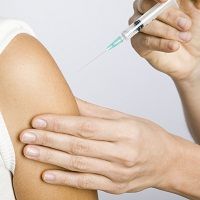States with Relaxed Vaccination Laws Experience More Outbreaks
Some states experience more preventable disease outbreaks than others, and at least part of the blame can be put on vaccination exemption laws.

Some states experience more preventable disease outbreaks than others, and at least part of the blame can be put on vaccination exemption laws.
Vaccination is one of the most effective ways to prevent certain illnesses, yet exemption laws have been on the rise. A large part of the exemptions come from religious and philosophical reasons — Mississippi and West Virginia are the only two states that do not accept nonmedical reasons.W. David Bradford, PhD, and Anne Mandich, a graduate student, from the University of Georgia (UGA) examined how these exemption laws have affected sickness rates from 2002 to 2012 using kindergarten vaccination data.
Pertussis, or whooping cough, was the primary focus of the study published in Health Affairs. Reports from the Centers for Disease Control and Prevention (CDC) recorded about 48,000 cases of pertussis in the US in 2012 — noting between 45,000 to 50,000 in an average year.
“States with stricter policies have lower pertussis rates, which shows that policymakers do have it within their power to further limit the spread of these disease,” Bradford, Busbee Chair in Public Policy in the UGA School of Public and International Affairs, said in a news release.
The CDC data determined an average of 60 cases of the measles during the analyzed decade. However, 95% of the population needs to be vaccinated in order to reach herd immunity.
“If you can be vaccinated and are not, that’s when we start to see whooping cough and measles cases rice,” Bradford said.
The team reviewed all of the states’ exemption policies and determined the level of effectiveness using the categories: least, less, somewhat, and most effective. A map detailed where each state fell on the scale. As of June 2012, California had the strictest vaccination laws in the country. Mississippi and West Virginia (mentioned earlier as the only two states which only allow exemptions for medical reasons) had the lowest amount of whooping cough cases.
The statement explained three key factors which proved to result in less whooping cough cases:
- Requiring state health department approval for nonmedical vaccination exemptions
- Allowing exemption from only specific vaccines instead of all vaccines
- Levying criminal and civil against those who do not comply with vaccination policies
The 18 states with the most effective exemption policies included:
- Arkansas
- Delaware
- Florida
- Indiana
- Iowa
- Kansas
- Kentucky
- Maryland
- Massachusetts
- Missouri
- Montana
- Nebraska
- Nevada
- New Mexico
- North Carolina
- South Dakota
- Tennessee
The nine states with the least effective exemption policies included:
- Colorado
- Idaho
- Michigan
- Minnesota
- Texas
- Utah
- Vermont
- Washington
- Wisconsin